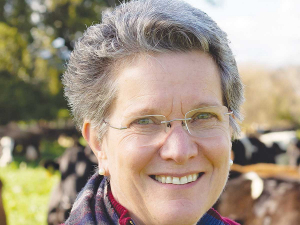Co-ops - better together than apart
OPINION: On their second date, my mother, then 17, told my father that she was a socialist. His response was that he was a conservative, so that would mean that their children would be liberals!
 Nicola Shadbolt says that in the current climate, the cooperative ethos and principles resonated with consumers.
Nicola Shadbolt says that in the current climate, the cooperative ethos and principles resonated with consumers.
Agribusiness expert Professor Nicola Shadbolt says that New Zealand cooperatives have a bright future ahead of them.
Shadbolt, a professor of agribusiness and farm management at Massey University, received the Outstanding Co-operative Contribution Award at the Cooperative Business New Zealand Awards last month.
“There is scope to explore co-ops in other sectors and to continue to learn from and share how co-ops and other collective groups work best so we evolve to be stronger still,” Shadbolt told Dairy News.
She says that in the current climate, the cooperative ethos and principles resonated with consumers, but that people need to recognise that businesses were cooperatives.
“Co-ops in New Zealand need to make much more of the fact they are a cooperative, they are a collective of members.
“Collective action is critical when power imbalances exist in markets; farmers are weak sellers and weak buyers by default as our businesses are much smaller than those we transact with,” she said.
She adds that co-operatives provide farmers with an opportunity to have a more active role in the supply chain.
Shadbolt says the co-operative system is often misunderstood by some of the people who wish to change how it works.
“Remember that cooperatives are not taught in business schools of New Zealand so in the majority of cases they are an unknown construct for the accountants and business managers cooperatives employ or put on their boards.”
She says the instinct in these cases is to change the model into a corporate model, which weakens cooperatives.
Shadbolt says she wants to recognise her postgraduate students for their work in building an understanding of the cooperative business model.
“These students are the means by which the cooperative body of knowledge grows,” she said.“My hope is that the learning, and the sharing of that learning, never ends, as that is how the model will best evolve,” she said.
Fonterra has cemented its position as the country’s number one cheesemaker by picking up nine NZ Champion of Cheese trophies this year.
New Zealand dairy processors are welcoming the Government’s commitment to continuing to push for Canada to honour its trade commitments.
An educational programme, set up by Beef + Land New Zealand, to connect farmers virtually with primary and intermediate school students has reported the successful completion of its second year.
The Food and Agriculture Organisation of the United Nations (FAO) has welcomed a resolution adopted by the United Nations (UN) General Assembly to declare 2026 International Year of the Woman Farmer.
Waikato herd health veterinarian Katrina Roberts is the 2024 Fonterra Dairy Woman of the Year.
Horticulture NZ chief executive Nadine Tunley will step down in August.
OPINION: Canterbury milk processor Synlait is showing no sign of bouncing back from its financial doldrums.
OPINION: It seems every bugger in this country can get an award these days.